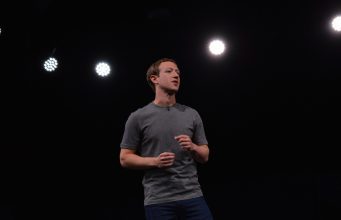
In an interview with The Information, Facebook CEO Mark Zuckerberg continued to project his bullish outlook on XR as the future of computing, saying that the company is already working on Oculus Quest 3 and 4. He also spoke about what he believes are key features and challenges for future Oculus headsets.
In a conversation published this week, The Information reporters Alex Heath and Mathew Olson spoke with Facebook’s Mark Zuckerberg about the company’s ongoing XR efforts.
Zuckerberg said, as he has previously, that he believes Quest 2 will be a breakout product in the VR space.
“[…] Quest 2 is I think going to be the first mainstream virtual reality product. It’s already—just in the few months that it’s been out—quite outsold the first version of Quest […].”
He further confirmed the company is already at work on two subsequent versions of the headset.
“Because of how hardware gets developed, you kind of need to know what your next three products are going to look like, all at the same time. It’s not like software where we’re changing it every week or every couple of weeks,” Zuckerberg said. “So we have product teams spun up now working on the next few generations of virtual reality and what Quest 3 and 4 are going to look like. And then of course fundamental technology that goes into that in terms of improving the optics, and the performance of it, and making it smaller and lighter, and adding a lot of functionality that you’d want.”
Zuckerberg said that many of the company’s feature priorities for future VR headsets are guided by the desire to deliver “social presence”—the feeling of being physically near someone even at a distance.
“For example one of the things that I’m really excited about for future versions [of Quest] is getting eye-tracking and face-tracking in, because if you’re really excited about social presence, you want to make sure that the device has all the sensors to really animate realistic avatars so you can communicate well like that.”
While there’s no telling if such features would make it into Quest 3, 4, or beyond, Zuckerberg also highlighted both varifocal optics and high-dynamic range (HDR) displays as key challenges to address in future headsets.
“[…] you have different challenges on the optics around VR then what you’ve had historically with phones or computers. Because, of course, in VR the screen isn’t just in one place. You have objects at different planes. […] in modern VR the displays basically only project stuff at one focal length,” Zuckerberg told The Information reporters. “So your eyes try to focus [when looking at close objects] and you can’t because they’re just projecting one distance. That’s something that needs to get solved. The problem is basically called varifocal… [you need to make] some kind of liquid lenses, or mechanically moving lens that can project things at different distances.”
“Probably the hardest challenge though in terms of the display and getting it to be super vivid is… it’s the HDR problem. TVs have gotten a bit better on HDR recently, but the vividness—measured in nits [brightness], is the unit for this—of screens that we have, compared to what your eye sees in the real world, are an order of magnitude or more [insufficient],” Zuckerberg said. “Which means that you’re probably not going to want to live in a world of passthrough VR anytime soon because you’re not going to want to give up the vividness of what your eyes can really see in terms of the contrast and the brightness of colors if everything is just slightly duller in VR.”
Zuckerberg said these were just some of the “basic types of challenges” the company is hoping to solve for “some of the upcoming versions [of our VR headsets] and sort of over the next 10 years […].”
So while Quest 3 & 4 are already in the works, it might be a while yet before we see more advanced features like varifocal or HDR. We’d expect that, in addition to being made smaller and lighter, eye-tracking and mouth-tracking are more likely to make it into Quest headsets in the near term.
Zuckerberg also spoke more broadly about the company’s XR initiatives, including the Facebook smartglasses that are due to launch this year and the wrist-worn input the company has been perusing. See The Information for the complete conversation.
The post Facebook Already Working on Quest 3 & 4, Zuckerberg Talks Key Features for Future Headsets appeared first on Road to VR.
from Road to VR https://ift.tt/3tfMsCE
via IFTTT
No comments:
Post a Comment